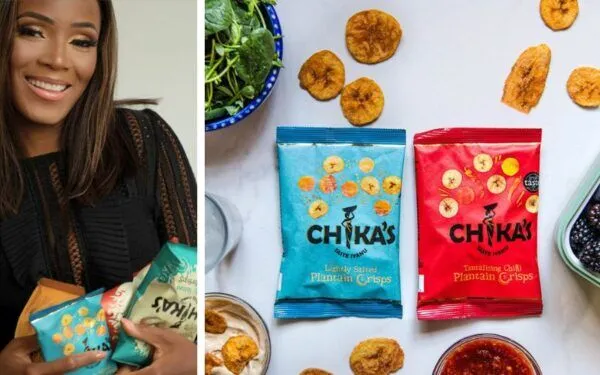
Chika Russell (left); a selection of Chika’s Food plantain crisps (right).
Chika’s Foods is a UK-based company offering nuts, plantain crisps, and rice crisps. Founder and CEO Chika Russell was inspired by snacks and flavours from Nigeria, where her family originally hails from. Jeanette Clark speaks to Russell about getting her snacks onto the shelves of some of the UK’s largest supermarkets, and the company’s expansion into Nigeria where its local subsidiary just opened its first factory.
In 2014, Chika Russell sat down to brainstorm how she could get out of the accounting world and start her own business. She was on maternity leave, expecting her second child, and wanted to try something new.
Born in the UK as the youngest of seven children, she had spent many holidays in Nigeria where her family had roots. She loved the culture and the food, and as an adult would prepare Nigerian snacks such as fried plantain, roasted yam, and toasted groundnuts for her dinner party guests. The popularity of these snacks, together with a gap identified in the UK snack market for Nigerian food, inspired her to register Chika’s Foods by the end of 2014.
In 2015, she began offering her hand-toasted and flavoured peanuts and plantain crisps – initially made and packaged at home – to local cafés, delis, and gastropubs. Again, they were a hit, bolstering Russell to approach supermarkets to see if they would list the products in their stores.
Both Waitrose and Ocado approved her products, prompting Russell to secure the raw materials from Nigeria and find a contract manufacturer to commence production.
In that same year, she pitched her business idea to five potential investors on the British reality television business programme, Dragon’s Den (see video of pitch below). Russell received offers from all five of the investors, accepting one on-screen, but later turning down the offer. She ended up securing more than £800,000 (US$1 million) from several high-net-worth individuals to build her brand.
Scaling the business
By 2016, Russell was still the only employee, managing to supply orders to various supermarkets by working with contract manufacturers.
Finding a manufacturer willing to meet Chika’s initial small order quantities was a challenge. “They would run at minimum order quantities of 200,000 and [Chika’s] only needed 5,000,” says Russell.
The company was not yet able to afford stock management and customer management software, so Russell, with her background in management accounting, set up all the relevant working documents for these processes in Microsoft Excel. To create an online presence for the brand, she hired one intern to help with social media, later adding another sales intern as orders expanded.
Distribution grew gradually: First Waitrose and Ocado, then Whole Foods, Sainsbury’s and some hotels. “For my first orders into hotels, I still packed the pallets outside my house,” Russell remembers.
Near the end of 2016, she added an additional ten people to focus on sales and marketing. Operational headquarters moved out of the top floor of her home and into the company’s first dedicated office.
Two new products were also added: sea salt and black pepper cashews and smoked almonds.
As order volumes increased, Chika’s partnered with a third-party logistics supplier, relieving Russell from the pallet-wrapping duties.
For the next three years, the company focused on cementing its processes, establishing financial controls, getting the right stock management systems in place, growing its distribution base and building order volumes.
Expansion into Nigeria
In 2020, Chika’s engaged in discussions with Alitheia IDF, a private equity investment firm active in six African countries, including Nigeria. For Russell, the time was right to rekindle a dream that once seemed impossible: venturing into manufacturing and sales directly in Nigeria, creating jobs and making a difference.
“In the beginning, the plan wasn’t to launch in Africa because that dream was just too big for me,” she says. “The UK was an addressable market.”
Six years later, the time was right, and in December 2021 Alitheia announced its investment in Chika’s Foods’ African subsidiary Chika’s Wholefoods Africa.
The two years since then have been “astronomical” in terms of everything that had to get done, says Russell. She spent considerable time in Nigeria, scouting locations for the factory, and assembling a team of over 100 people. The company decided to build its own facility, and shortly after the investment was announced, construction started on the outskirts of Lagos.
“We went into hiring a team straight away, over a hundred people, from factory build engineers to architects, to quality assurance, to procurement, etc. We also hired a sales team to survey the market and understand what the appetite would be for the kind of products we wanted to launch,” she explains.
Tailoring products for local preferences
Based on its market research Chika’s decided to focus on an entirely different type of snack for the Nigerian market. Where it now offers plantain crisps, cashews, almonds and rice in different flavours as part of its product portfolio in the UK, in Nigeria the company launched three flavours of maize puffs: Chicken Chop, Fire Grill and Easy Cheesy.
In Europe, consumers want gluten-free, low-salt, vegan and vegetarian snacks with re-sealable packaging to eat some now, and the rest later, says Russell. In Africa, it is completely different. People want a snack that they can immediately consume and if the pack is too big, they will share it with other people, the CEO explains. The African market is also more open to meat flavourings – hence the Chicken Chop option for Nigeria.
Before finalising the product line-up, Chika’s Wholefoods Africa released a million units of its maize puffs into the market to get real feedback on whether distributors would buy it, or consumers would like it. The strategy worked.
“In the UK we must pitch to retailers and buyers. Whereas in Nigeria, before the samples finished, we had distributors and retailers calling us,” says Russell.
Future plans
Chika’s Foods operates with 12 permanent employees in the UK using a co-manufacturing model. In Nigeria, the team has already grown to 155.
Russell’s immediate plans include scaling the existing factory and acquiring additional properties for the company’s expansion.
“Based on the size of our current facility and the size of the possible additional facility, which we are already in talks for, we definitely have the ability to continue to grow and scale our operations,” she says.
The company aims to become Nigeria’s largest snack manufacturer, and to achieve this goal, it has a pipeline of new products ready for launch after establishing brand awareness and market penetration.





